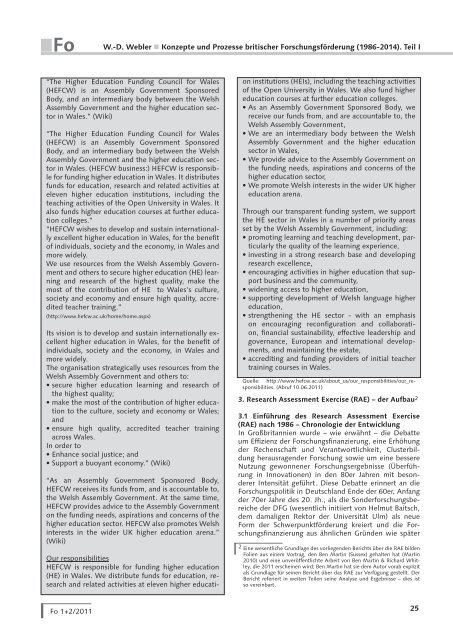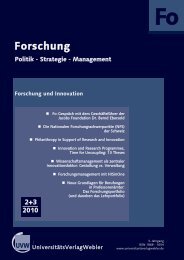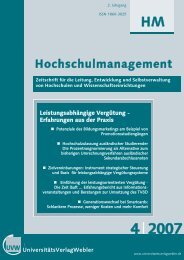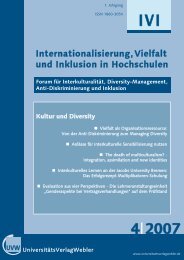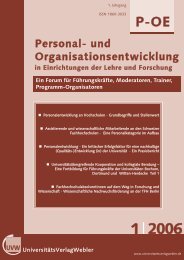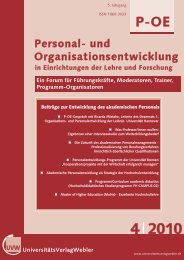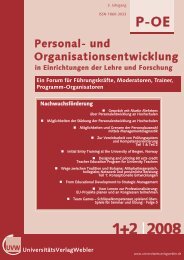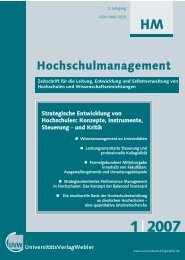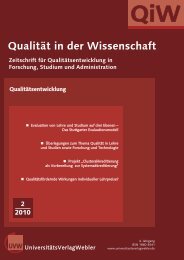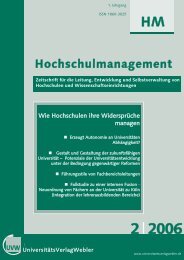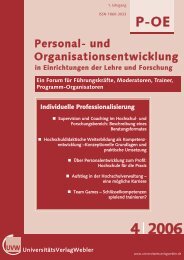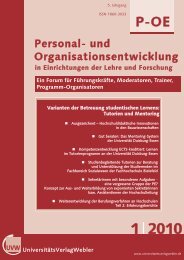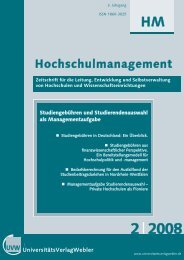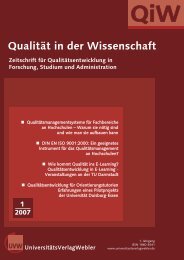Heft 1 + 2 / 2011 - UniversitätsVerlagWebler
Heft 1 + 2 / 2011 - UniversitätsVerlagWebler
Heft 1 + 2 / 2011 - UniversitätsVerlagWebler
Sie wollen auch ein ePaper? Erhöhen Sie die Reichweite Ihrer Titel.
YUMPU macht aus Druck-PDFs automatisch weboptimierte ePaper, die Google liebt.
Fo<br />
W.-D. Webler • Konzepte und Prozesse britischer Forschungsförderung (1986-2014). Teil I<br />
“The Higher Education Funding Council for Wales<br />
(HEFCW) is an Assembly Government Sponsored<br />
Body, and an intermediary body between the Welsh<br />
Assembly Government and the higher education sector<br />
in Wales.” (Wiki)<br />
“The Higher Education Funding Council for Wales<br />
(HEFCW) is an Assembly Government Sponsored<br />
Body, and an intermediary body between the Welsh<br />
Assembly Government and the higher education sector<br />
in Wales. (HEFCW business:) HEFCW is responsible<br />
for funding higher education in Wales. It distributes<br />
funds for education, research and related activities at<br />
eleven higher education institutions, including the<br />
teaching activities of the Open University in Wales. It<br />
also funds higher education courses at further education<br />
colleges.”<br />
“HEFCW wishes to develop and sustain internationally<br />
excellent higher education in Wales, for the benefit<br />
of individuals, society and the economy, in Wales and<br />
more widely.<br />
We use resources from the Welsh Assembly Government<br />
and others to secure higher education (HE) learning<br />
and research of the highest quality, make the<br />
most of the contribution of HE to Wales's culture,<br />
society and economy and ensure high quality, accredited<br />
teacher training.”<br />
(http://www.hefcw.ac.uk/home/home.aspx)<br />
Its vision is to develop and sustain internationally excellent<br />
higher education in Wales, for the benefit of<br />
individuals, society and the economy, in Wales and<br />
more widely.<br />
The organisation strategically uses resources from the<br />
Welsh Assembly Government and others to:<br />
• secure higher education learning and research of<br />
the highest quality;<br />
• make the most of the contribution of higher education<br />
to the culture, society and economy or Wales;<br />
and<br />
• ensure high quality, accredited teacher training<br />
across Wales.<br />
In order to<br />
• Enhance social justice; and<br />
• Support a buoyant economy.” (Wiki)<br />
“As an Assembly Government Sponsored Body,<br />
HEFCW receives its funds from, and is accountable to,<br />
the Welsh Assembly Government. At the same time,<br />
HEFCW provides advice to the Assembly Government<br />
on the funding needs, aspirations and concerns of the<br />
higher education sector. HEFCW also promotes Welsh<br />
interests in the wider UK higher education arena.”<br />
(Wiki)<br />
Our responsibilities<br />
HEFCW is responsible for funding higher education<br />
(HE) in Wales. We distribute funds for education, research<br />
and related activities at eleven higher education<br />
institutions (HEIs), including the teaching activities<br />
of the Open University in Wales. We also fund higher<br />
education courses at further education colleges.<br />
• As an Assembly Government Sponsored Body, we<br />
receive our funds from, and are accountable to, the<br />
Welsh Assembly Government,<br />
• We are an intermediary body between the Welsh<br />
Assembly Government and the higher education<br />
sector in Wales,<br />
• We provide advice to the Assembly Government on<br />
the funding needs, aspirations and concerns of the<br />
higher education sector,<br />
• We promote Welsh interests in the wider UK higher<br />
education arena.<br />
Through our transparent funding system, we support<br />
the HE sector in Wales in a number of priority areas<br />
set by the Welsh Assembly Government, including:<br />
• promoting learning and teaching development, particularly<br />
the quality of the learning experience,<br />
• investing in a strong research base and developing<br />
research excellence,<br />
• encouraging activities in higher education that support<br />
business and the community,<br />
• widening access to higher education,<br />
• supporting development of Welsh language higher<br />
education,<br />
• strengthening the HE sector - with an emphasis<br />
on encouraging reconfiguration and collaboration,<br />
financial sustainability, effective leadership and<br />
governance, European and international developments,<br />
and maintaining the estate,<br />
• accrediting and funding providers of initial teacher<br />
training courses in Wales.<br />
Quelle: http://www.hefcw.ac.uk/about_us/our_responsibilities/our_responsibilities.<br />
(Abruf 10.06.<strong>2011</strong>)<br />
3. Research Assessment Exercise (RAE) – der Aufbau 2<br />
3.1 Einführung des Research Assessment Exercise<br />
(RAE) nach 1986 – Chronologie der Entwicklung<br />
In Großbritannien wurde – wie erwähnt – die Debatte<br />
um Effizienz der Forschungsfinanzierung, eine Erhöhung<br />
der Rechenschaft und Verantwortlichkeit, Clusterbildung<br />
herausragender Forschung sowie um eine bessere<br />
Nutzung gewonnener Forschungsergebnisse (Überführung<br />
in Innovationen) in den 80er Jahren mit besonderer<br />
Intensität geführt. Diese Debatte erinnert an die<br />
Forschungspolitik in Deutschland Ende der 60er, Anfang<br />
der 70er Jahre des 20. Jh., als die Sonderforschungsbereiche<br />
der DFG (wesentlich initiiert von Helmut Baitsch,<br />
dem damaligen Rektor der Universität Ulm) als neue<br />
Form der Schwerpunktförderung kreiert und die Forschungsfinanzierung<br />
aus ähnlichen Gründen wie später<br />
2 Eine wesentliche Grundlage des vorliegenden Berichts über die RAE bilden<br />
Folien aus einem Vortrag, den Ben Martin (Sussex) gehalten hat (Martin<br />
2010) und eine unveröffentlichte Arbeit von Ben Martin & Richard Whitley,<br />
die <strong>2011</strong> erscheinen wird; Ben Martin hat sie dem Autor vorab explizit<br />
als Grundlage für seinen Bericht über das RAE zur Verfügung gestellt. Der<br />
Bericht referiert in weiten Teilen seine Analyse und Ergebnisse – dies ist<br />
so vereinbart.<br />
Fo 1+2/<strong>2011</strong><br />
25


